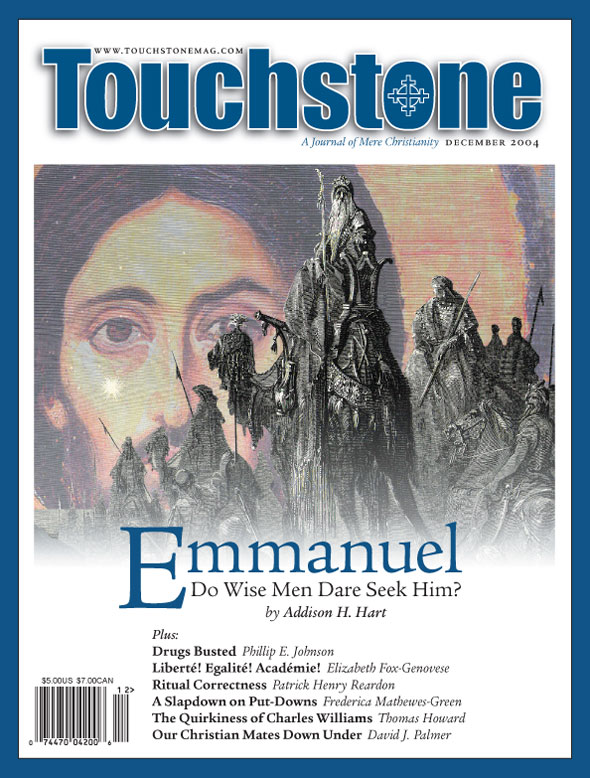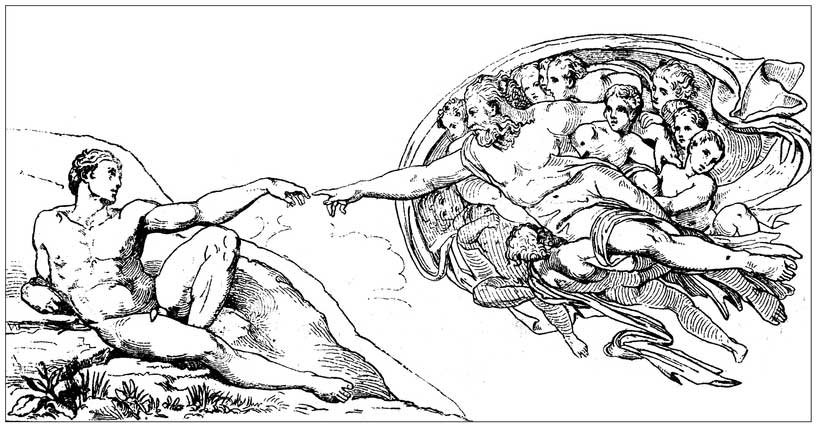Green Hornets’ Nest
Varieties of Environmentalism
While Touchstone’s work on behalf of the intelligent design movement has emphasized fundamental differences in the believer’s and nonbeliever’s understanding of nature, not all believers will agree on the practical outworkings of their faith with respect to the stewardship of the environment, and not all unbelieving environmentalists are of the same sort. The love of nature forms a bond between believers and some of those who do not recognize God as its Maker—and so do not recognize their love of nature as love of the God they “ignorantly worship”—while other forms of radical environmentalism are clearly diabolical, clearly based in hatred of the beauty of the Good. Some important distinctions need to be made here.
No one who loves can rejoice in seeing the world disordered by the greed and negligence of man. Tolkien’s Mordor is a picture of a polluted world, full of the waste of Sauron’s ambition, its life killed, its waters foul, its air a poisonous reek, all of this an expression of a monster’s will to power and the inevitable hatred of everything beautiful and good that follows.
It is also, so far as it depicts the author’s encounter with the ugly results of the industrial revolution, a vision of the work of a large supporting cast caught up in its desire for more money and cheaper “goods,” and to this end supporting irresponsible industry. One cannot simply blame the capitalists, not only because much of the world’s worst environmental pollution is the product of communism, but also because of nearly everyone’s wish for what the modern world considers a better life—a desire that must be disciplined if nature is to be given its proper order and dignity.
Environmental Sorts
One of the great difficulties set before those who believe in God and in man’s mandate to exercise proper care of the natural world, however, is that interest in environmental stewardship seems to be easily co-opted by those whose interests are fundamentally inhumane, and with whom any common cause is compromised by what Christians should recognize as the form of a heresy. Like every other heresy, it seizes upon a truth or a virtue, in this case the essential goodness of the natural world and man’s responsibility to care for it, and uses it to oppose other truths that require equal respect.
In its most radical form it is clearly demonic. C. S. Lewis’s example is sketched out in That Hideous Strength in Filostrato: Man is not only the polluter, but also, because he is organic life, the pollution. The greatest service he can do for the highest good is to rid the world of himself and all other organisms—to turn nature over to pure Spirit with the most tenuous connections possible to matter, that is, to turn nature over to the demons.
Although one hears little of this opinion in its strongest form—few have reached the level of initiation necessary to become enamored with the suicide of the race—one does experience its penumbra in the opinion that man is a compulsive and irreformable destroyer who cannot keep to his place in nature, so that attempts to bring his perverse hegemony to an end, returning the planet to less harmful forms of life, is in the end the chief goal of true environmentalism. Nothing, by this light, would serve the world quite so well as a plague of universal proportions and unprecedented virulence. Ideally it would leave only a small human residue, content to live in a modestly pre-industrial way, subject to, rather than the subjector of, nature.
Most secular environmentalism is not, of course, quite so radical. It has a high regard for man, not because he is made in the image of God, but because it is thoroughly infected with modernist hubris. It invariably regards itself as “scientific,” an attitude Lewis mocks in another character in That Hideous Strength, Professor Weston, who wishes to extend the life of the human race infinitely while wholly unable to give a reason for a valuation that justified it. Such men, Lewis thought, were spiritually salvageable, but only if and when they regained their reason.
This sort of environmentalism regards the belief that God created the world and all it contains for man, the unique possessor of the image of God, nature’s reason for being and its master, as mythological. Man is, in this view, an important and powerful agent in nature, justified in its will for itself in the sense that one competitor is among others, but in no categorical sense different from its other parts. Weston’s conundrum was in his attempt to act as though man was different in kind from other parts of nature while at the same time firmly denying it in principle.
The New Breed
S. M. Hutchens is a senior editor and longtime writer for Touchstone.
subscription options
Order
Print/Online Subscription

Get six issues (one year) of Touchstone PLUS full online access including pdf downloads for only $39.95. That's only $3.34 per month!
Order
Online Only
Subscription

Get a one-year full-access subscription to the Touchstone online archives for only $19.95. That's only $1.66 per month!
bulk subscriptions
Order Touchstone subscriptions in bulk and save $10 per sub! Each subscription includes 6 issues of Touchstone plus full online access to touchstonemag.com—including archives, videos, and pdf downloads of recent issues for only $29.95 each! Great for churches or study groups.
Transactions will be processed on a secure server.
more from the online archives
calling all readers
Please Donate
"There are magazines worth reading but few worth saving . . . Touchstone is just such a magazine."
—Alice von Hildebrand
"Here we do not concede one square millimeter of territory to falsehood, folly, contemporary sentimentality, or fashion. We speak the truth, and let God be our judge. . . . Touchstone is the one committedly Christian conservative journal."
—Anthony Esolen, Touchstone senior editor









